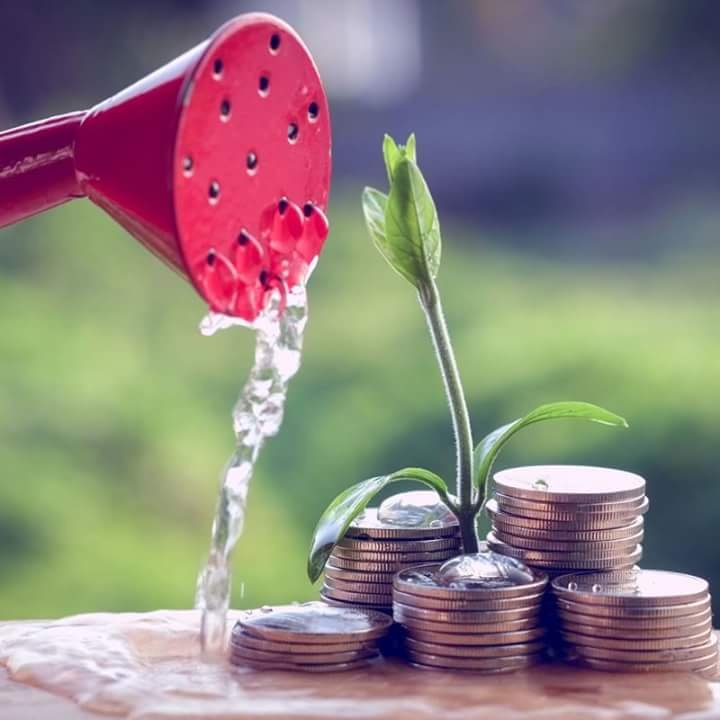If you had followed me closely, you would have observed that am always excited to talk about financial freedom or financial prosperity, if you like.

The reasons?
I have explained that I hate to be stranded as much as I hate to see anyone around me to be stranded especially financially.
This is because we all need money to live, even, an average life.
Hence, the HOLY BOOk recognizes that money is a “defence” (Eccl. 7:12)
On that note I cherish financial advice of all sorts, and I feel so elated sharing the same so that whosoever that has ears will hear and be financially independent, at least to an extent.
Hence, when I came across this write up by SUBOMI PLUMPTRE, I felt duty bound to share it with you on this platform
I guess you will learn a thing or two from it. Do enjoy it.
"Since I published my article titled, Money: What I Wish I Knew 15 Years Ago, some people have asked the question, "Subomi, how can I invest 1 million Naira?"
I will provide some answers in this post. As usual, I speak from personal experience, and not as a financial adviser.

You must perform your due diligence and speak to your financial adviser. It's the responsible thing to do.
If you haven't read my previous article, please do so now as it contains invaluable background information:
Now, I won't assume everyone has a million. So, let me lay out a plan for building up 1 million Naira, from your existing earnings:
- Set aside at least 10% of your salary (and other income sources) every month . Separate the funds from your account immediately, so you do not spend it.
Transfer the funds to an interest bearing investment account.
You may use a Money Market Fund account, which I explain later. Keep "topping up" the account until it grows to N1 million.
I will now recommend plans for different stages of investment, depending on how much is available to you.
- N1,000 to N300,000
a. Money Market Funds
You may start your investment journey with a Money Market Mutual Fund.
In simple terms, a money market mutual fund is a platform where individuals with small amounts come together, to invest as a group.
The funds are managed by professional fund managers, and are invested in securities issued by governments, financial institutions and large corporations, who need to raise cash.
An example of those securities is Treasury Bills. Money Market Funds are liquid and safe. They are different from Equity Funds which invest in stocks & shares.
When considering a Money Market Fund, look out for these phrases - "Guaranteed Income" and "Open-Ended". What they mean is, your principal is guaranteed and you can also top up your account or cash out at any time.
Usually there's a small penalty if you cash out before 30 days. The ease of topping up regularly, satisfies the need for an account to which you can transfer a percentage of your earnings, on a regular basis.
The flexibility to cash out means you can use the funds to invest in other things, as soon as you identify them.
At the time of writing, the performance of Money Market Funds was 18% per annum. If you cash out in 3 months, prorate the annual return for a 3-month period. You will earn 4.5%. This is much better than a savings account which has a return of 4% per annum or 0.3% per month, in some cases.
Many Money Market Funds pay dividends (returns) on a quarterly basis, which you can re-invest. (Please don't spend it oh!) Examples of Money Market Funds include Stanbic IBTC Money Market Fund, ARM Money Market Fund and Stanbic IBTC Guaranteed Investment Fund.
The minimum investment is between N5,000 to N10,000. Investment One's Abacus Money Market Fund has a minimum investment of N1,000, but the return is not as high as other company's mutual funds.
b. Treasury Bills
Treasury bills (TBills) are backed by the Federal Government and may be easily purchased through your bank. This is the process for investing:
Call your bank to ask for the minimum amount needed to purchase TBills. The amount differs from bank to bank but is usually, N100,000. For now, only those with at least N50 million can bid for TBills directly from the Central Bank and specify their desired rates.
So, as a retail buyer, you should go through your bank and use the rates they advise. You can assess the range of rates on CBN's website.
Your bank will send you a form. Fill it and return it to your bank. The entire process may be done via email.
Typically TBills are sold at a discounted rate. This means you pay N82,000 for N100,000 worth of TBills, for instance. After 364 days, you get N100,000.
Profits from TBills are not taxed, which is a plus, but, you can't top up an existing account. The account is inflexible.
You can merge two investment types. Let me run a sample scenario for you (without accounting for fees).
You buy N100,000 worth of TBills at N82,000. You then re-invest N18,000 in a Money Market Fund and earn another N3,240 per year. Your investment strategy depends on how involved you want to be in the process.
- N300,000 - 750,000
Agriculture Crowdfunding
You may invest in any credible agriculture crowdfunding platform, like FarmCrowdy. I described the process in detail here. Other companies include Thrive Agric and Grow Crops Online.
When you invest, please do not put all your eggs in one basket. For instance, on FarmCrowdy, Poultry has the shortest tenor and the lowest investment commitment.
Your principal is guaranteed by Leadway Assurance; but should there be bird flu, you will lose your profit, even though you retain your principal. So, I advise you to hedge your investment by spreading it across different types of farms - rice, maize, etc.
You may also consider investing in farming or export cooperatives, where you come together with others to buy farming inputs or to sponsor an export container.
You will receive profits upon harvest or after your container reaches the buyers. These are risky ventures and I do not advise them, unless you thoroughly understand the business models of the ventures and trust the people involved.
- N750,000 to N1,000,000
Investment Mix
You may explore a mix of Agriculture Crowdfunding and Land. Like I mentioned in an article on property, there are many virgin real estate opportunities. They fall within the N250,000 to N1,000,000 range.
You may invest in land with friends. For example, there is a piece of land I bought for N500,000. The buy-in was N2,500,000, but a few friends came together and we split the cost. The plan is to sell off in a few years.
You may also take advantage of land opportunities in your home town. Ask your parents to help you to identify land you can buy. They will know the "Omo Oniles" and can negotiate for you.
Target areas that are close to business districts or main roads, in the hope of someday selling off to commercial entities.

You may target growing residential areas as well. As people retire to those areas, the value of your property will rise
Before you invest on any platform, please do your due diligence and ask the following questions:
What is the minimum investment amount?
What is the tenor?
What are the fees?
What has the return been for the last 6 months to 1 year?
Who are the promoters?
In summary, if you have N1,000,000, I would advise you to invest in a mix of Agriculture Crowdfunding, Virgin Land and Money Market Funds.
I hope this has been helpful. Thank you and feel free to share.
PS: I run a 3-day Investment Education Course on Whatsapp.
After the course, I connect people to credible and licensed investment managers. To learn about my course, please join my mailing list and check the box that says “Investment Course""
Thanks for reading!

I will also share another of her article entitled: financial knowledge I should know 15 years ago.
Hi! I am a robot. I just upvoted you! I found similar content that readers might be interested in:
http://subomiplumptre.com/1million/
It was duly stated